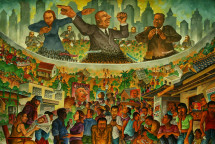Ideas into movement
Boost TNI's work
50 years. Hundreds of social struggles. Countless ideas turned into movement.
Support us as we celebrate our 50th anniversary in 2024.

How are we to explain Spain’s alleged immunity to the political trends, such as rising authoritarian populism, seen in other countries with similar economic circumstances?

This paper defend a straightforward answer to this riddle: authoritarian populism has been kept at bay by a series of popular democratic (or “republican”) movements that have offered a potentially emancipatory response to the disenfranchisement and dispossession experienced by large sectors of the Spanish population. Yet these movements have had a poor penetration in the Spanish countryside, a troubling circumstance that reflects a growing divide between city and country and the political isolation of the latter.
Thus, if the argument that the republican movements have stopped the emergence of authoritarian populism contains some truth, we could well hypothesize that the poor penetration of the former in rural Spain converts the inhabitants of this part of the country into a potential social base for the latter. This hypothesis gains strength once we observe that the economic crisis has exacerbated dispossession (impoverishment, land concentration) and disenfranchisement (feelings of abandonment, erosion of self - esteem) in rural Spain. I thus suggest that the specter of reaction haunts the countryside, but I also argue that this specter coexists with republican possibilities.
This paper is divided into four parts. The first one examines the current Spanish conjuncture. The second explores the effects of crisis and austerity in the Spanish countryside. Part three moves to Southern Catalonia, a region where the author has been conducting ethnographic fieldwork since 2010 (see Franquesa 2018). He examines how in that region a broad movement — popularly known as the “Southern revolt” — against land (and water and green) grabbing was able to reveal, and combat, the uneven ecological foundations of an unfair, territorially and class-inflected structure of accumulation and political domination.
Although the Southern revolt peaked in the first years of this century, its echoes are still noticeable today in a region that has politically moved to the left since the turn of the century. Southern Catalonia and the Southern revolt thus offer a telling example of how feelings of abandonment in the countryside can be given a popular democratic expression. The paper concludes with an examination of the role that the idiom of dignity played both in the Southern revolt and in the current, broader republican movements. Whereas this idiom offers an opportunity to bridge the existing political divide between country and city, connecting urban and rural experience and consciousness, it can also become a mobilising rhetoric for authoritarian populism. Both republican and reactionary specters can hide behind, and eventually thrive through, the demand for dignity.
This paper was presented at the Emancipatory Rural Politics Initiative (ERPI) 2018 Conference: "Authoritarian Populism and the Rural World"